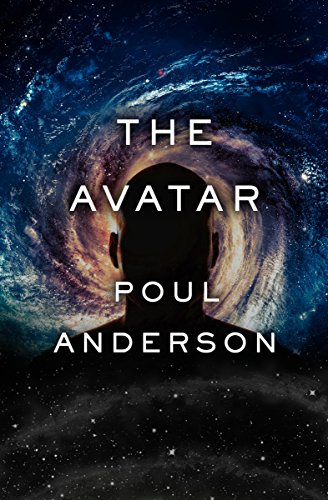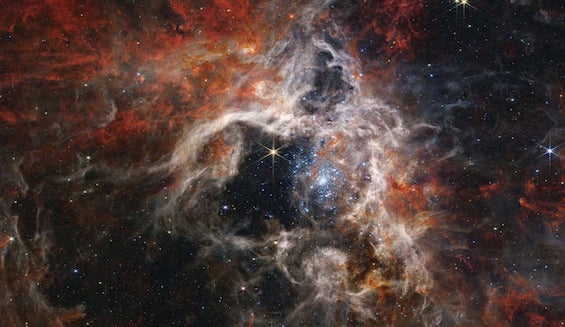
This is a big book as science fiction novels go, and it doesn’t fit it in any one of the standard categories. First Contact novel? Check. Space opera? Yes. Adventure story? That, too. Travelogue? Even that. Political novel? Oh, yes. But at its hard SF heart, Poul Anderson’s The Avatar is a character-driven tale set in the glorious vastness of galactic space. Because Anderson doesn’t force his story to move along at a blistering pace, as in a thriller. Rather, he stops to dwell on the local sights, sounds, and smells of every place along the journey—and to probe the psychological depths of every character. The pace is leisurely. But Anderson’s poetic way with words makes it work well nonetheless. This is an intriguing picture of a possible future among the stars for the human race.
Estimated reading time: 5 minutes
Humanity has begun a march through the galaxy
Anderson portrays a time in the not-too-distant future when humankind has begun a march to the stars. Two or three centuries earlier, a mission that traversed the far side of Earth’s orbit around the sun had chanced upon a mysterious satellite of obvious alien origin. Spinning in place at blinding speed, the satellite they dubbed a T machine created a portal through space-time. As they’ll learn later, it’s one of many scattered throughout the galaxy. But this one leads almost instantaneously 220 light-years away to a lush, Earth-like planet.
Now dubbed Demeter, the new world houses nearly three million people. There, Dan Broderson and his wife Lis live in luxury. They run a transportation company called Chehalis that makes them the wealthiest people on the planet. But Broderson is about to risk everything in a high-stakes conflict with the colony’s governor.
The Avatar by Poul Anderson (1978) 450 pages ★★★★☆

An eight-year mission to an alien civilization
The source of Broderson’s conflict with the governor is the exploratory starship Emissary. The dozen surviving members of its crew have just returned—only five months after leaving—from an eight-year mission to a distant planet they call Beta. The Betans have built a starfaring civilization far older and far more advanced than humanity’s. And the crew are returning with a Betan “ambassador” to begin negotiations for trade and cultural exchange between the two races.
But there are those on Earth and on Demeter who are determined to halt the movement to the stars and invest instead in meeting the challenges at home. Demeter’s governor is one of those. And she immediately orders Emissary quarantined and all news of its arrival suppressed. Getting word of this, Broderson sets out to defy the governor and carry news of the vessel’s return to his powerful in-laws, and the news media, on Earth.
Alien life abounds in our future among the stars
The universe, as Poul Anderson depicts it in this novel, teems with wonders beyond measure. Recent images from the James Webb Space Telescope suggest the visual marvels confronting his starfaring characters. But there is so much more to experience here—not just to see but to hear and smell and touch. On his characters’ leisurely journey between jumps through hundreds of parsecs and the limitless reaches of time, they begin to appreciate the endless varieties of sapient life that populate millions of worlds. But they can only speculate about the Others—the unknown and unknowable ancient race that built the star gates and nurtures sapient life everywhere within its reach.
His colorful imaginings aside, Anderson never loses sight of the human realities experienced by his characters. They breathe, eat, sleep, and dream. They fight and make up. And there’s lots of sex (though never explicitly described). In fact, the ever-shifting relationships among them are the author’s central preoccupation in The Avatar. Because in the final analysis Anderson explores the human condition fully as closely as he probes our possible future among the stars.
About the author

Poul Anderson (1926-2001) wrote scores of science fiction and fantasy novels and a huge number of short stories. His first novel was published in 1947, the last in 2003, two years after his death at the age of seventy-four. He won the Hugo Award seven times, the Nebula three, and was named a Grand Master of the Science Fiction Writers of America in 1997.
Anderson grew up in Pennsylvania speaking Danish, the language of his parents. He earned a BA in physics from the University of Minnesota, where the family had relocated. He began a career as a freelance writer immediately after his graduation in 1948.
For related reading
I’ve reviewed four other books by Poul Anderson:
- Tau Zero (In this great example of classic hard science fiction, humankind reaches the stars)
- The Boat of a Million Years (A journey from ancient history to the stars)
- The Corridors of Time (A legendary sci-fi author makes a mess of time travel)
- Brain Wave (How would you behave if your IQ suddenly doubles?)
For more great reading, check out:
- The five best First Contact novels
- These novels won both Hugo and Nebula Awards
- The ultimate guide to the all-time best science fiction novels
- The top science fiction novels
- 10 new science fiction authors worth reading now
And you can always find my most popular reviews, and the most recent ones, on the Home Page.

























